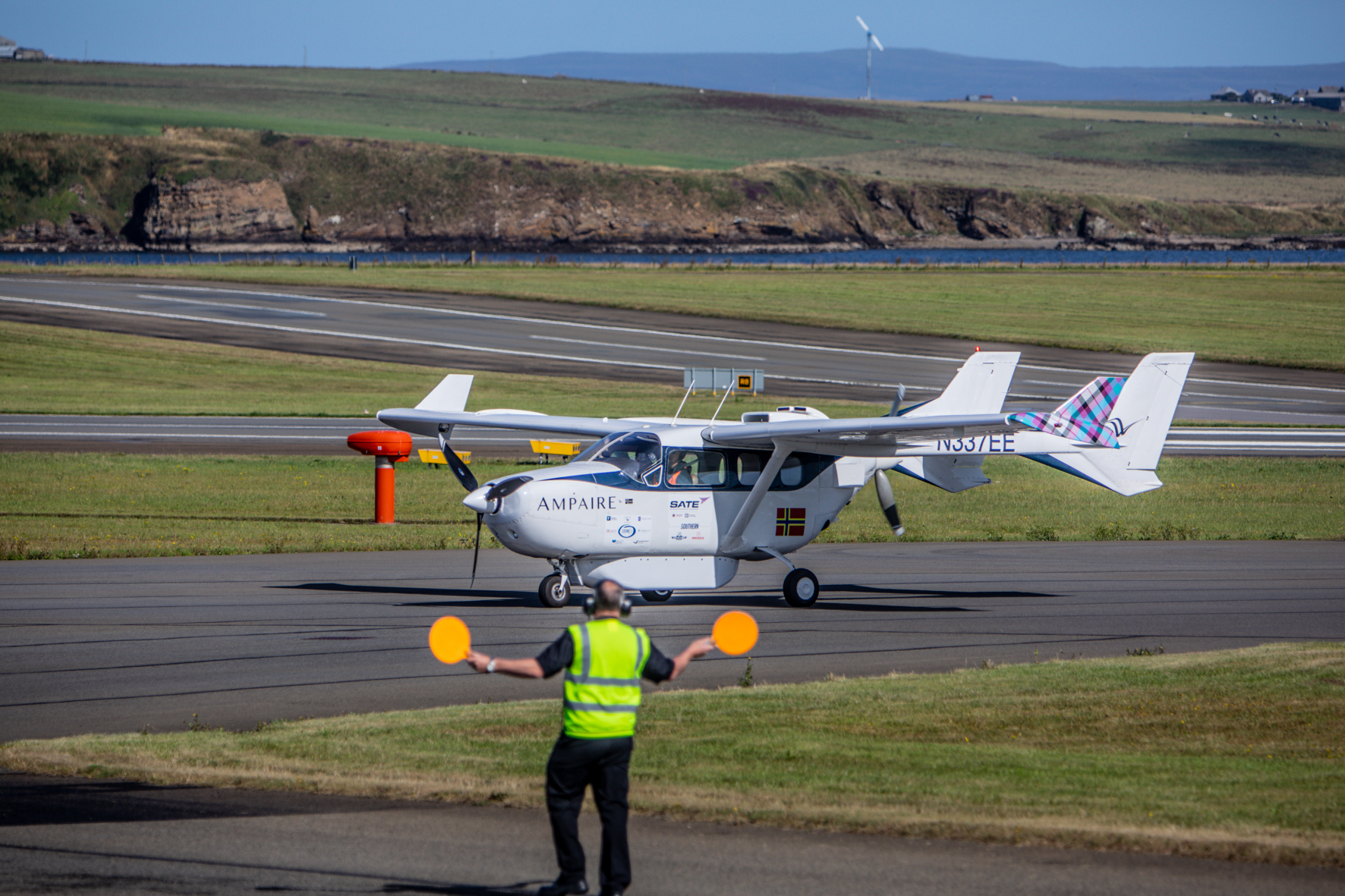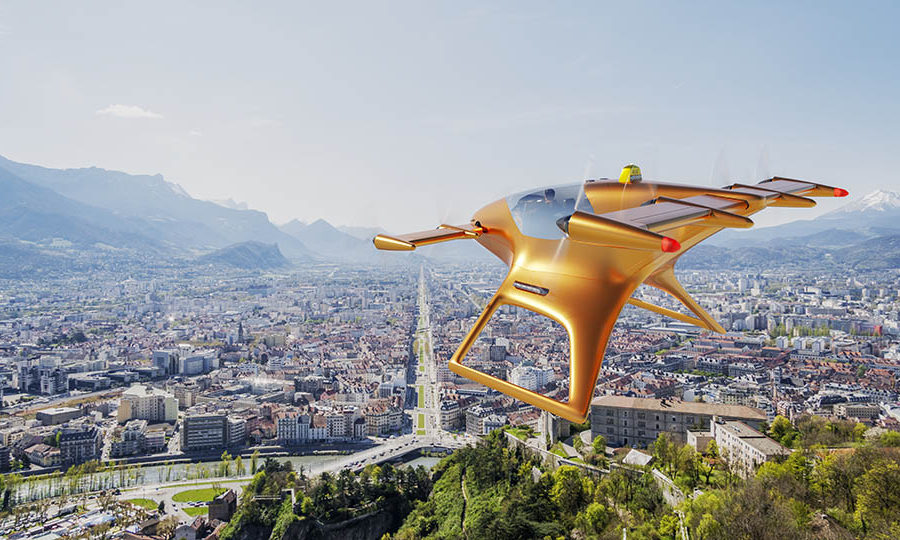Future Flight newsletter edition 3

Welcome to the third edition of the Future Flight newsletter. This month we look at the idea of sub-regional aviation: connecting smaller towns which often lack airports and even more remote rural locations. Sub-regional aviation also offers the chance to replace hub-and-spoke flying with more direct point-to-point services, all delivered by green aircraft. This kind of local connectivity could bring real economic and social benefits to communities, helping to level-up communities across the UK and beyond.
Future Flight helps levelling up
The Sustainable Aviation Test Environment
The Sustainable Aviation Test Environment (SATE) is a project which has established the UK’s first low carbon aviation test environment at an operational airport in Kirkwall, the largest town in the Orkney archipelago in Scotland.
The project will trial a host of aviation technologies including low-carbon hybrid-electric, hydrogen and the use of Sustainable Aviation Fuel (SAF). It will also investigate how unmanned aerial vehicles (UAV)s can be used to provide goods and services to island communities, for example, on-demand medical supplies directly to remote health centres.
By establishing an aviation test environment on Orkney, the project hopes to boost regional investment in the Scottish Highlands and Islands, providing a blueprint for regional development and creating green job opportunities. The project will support the local economy and aims to improve connectivity between remote islands while contributing to the UK government’s levelling up agenda.
The technology trials will help demonstrate the potential connectivity benefits on routes connecting the most remote islands in Orkney and Shetland.
SATE supports the UK government’s decarbonisation strategy while helping to deliver the Scottish Government’s goal to put the Highlands and Islands on a path to becoming the world’s first net-zero aviation region by 2040. Later this year, the team will demonstrate the use of UAVs for the delivery of goods to remote communities in Orkney for the first time, augmenting the ferry system.
Hydrogen Electric and Automated Regional Transportation
Hydrogen Electric and Automated Regional Transportation (HEART) is another project funded by the Future Flight Challenge that will contribute to the levelling up agenda by improving regional transport links. It aims to develop a zero carbon sub-regional air transportation network to enter service by 2025. The project is focused on demonstrating the feasibility of semi-autonomous hydrogen-powered light-aircraft for local travel.
The HEART project will demonstrate a complete aviation system including high authority automation for single pilot operations with remote support services utilising hybrid satellite and terrestrial communications, autonomous ground robots for refuelling and loading, modular terminal design, and integration with other transportation modes through Mobility-as-a-Service (MaaS) solutions to enable clear door-to-door journey options.
A key part of the project is the development of hydrogen fuel infrastructure, including production, storage, handling and refuelling. This will help to develop a skilled local workforce providing green jobs in operating and maintaining the infrastructure and aircraft.
The HEART team hopes to boost regional economic opportunity by providing sustainable jobs, boosting local services and increasing local tourism. In doing so, they hope to demonstrate how a local hydrogen economy can work, with a view to expanding the network. HEART will conduct a range of tests and technology demonstrations over the next year, leading up to a commercial operation demonstration in 2022.
Urban Air Port®: video
Urban Air Port® develops fully autonomous innovative zero emission infrastructure for future air mobility. The ambitious Air-One® project will bring industry, government and the public together to demonstrate how to unlock the potential of sustainable urban air mobility to reduce congestion, cut air pollution and holistically decarbonise transport while providing seamless passenger journeys and deliveries.
Future Flight Director’s update
The last few months have once again been busy for the Future Flight Challenge. In August we published our roadmap and vision for 2030. In it we set out the goals for our upcoming phase 3 competition and share our view of likely use cases for these new forms of flight. Including airport transfers, emergency services support and integrated cargo delivery. We recently published details of our phase 3 competition details too.
Our phase III competition has a real focus on demonstrating ambitious use cases for new aviation concepts by 2024. With £65m available in grant funding, it is open for applications until 3 November. There is no need to have bid before or participated in earlier phases of the Future Flight Challenge. Bring your ambitious ideas to the table and be willing to work together, not only as part of your consortium, but across projects too.
In this month’s newsletter we look at the idea of sub-regional aviation. Connecting smaller towns which often lack airports and even more remote rural locations. Sub-regional aviation also offers the chance to replace hub-and-spoke flying with more direct point-to-point services. All delivered by green aircraft. This kind of local connectivity could bring real economic and social benefits to communities. Helping to level-up communities across the UK and beyond.
Finally, some of our phase 2 projects are moving into their demonstration phases. The use of relaxing Covid-19 restrictions has allowed us to visit some of our funded projects. We’ve seen drones fly across the live airspace of an airport with Skyfarer and attended the first UK flight trials of the Ampaire Hybrid-electric 6-seater. The plane features in the SATE and 2Zero projects.
We look forward to seeing more demonstrations as projects move into their later stages and we build momentum for phase 3.
Future Flight Challenge phase 3 is now open
Future Flight events
Join us to hear about project ATOMICUS, an integrated solution for the delivery of cargo by drones. The project aims to integrate data flows with drones, infrastructure and existing systems to reduce costs and improve productivity.
Book here
14 Sept, 14:00-15:30 | Online | Future Flight Phase 3 competition briefing
Phase 3 of the Future Flight Challenge at UK Research and Innovation is now open. Details of the competition brief for Phase 3 are now available and can be found here.Join this briefing event to hear the Future Flight Challenge team talk through full details of the competition and how you can apply.
Book here
17 Sept, 09:30-10:15 | Online | Future Flight Café: developing zero emission UAV flight
Join us to hear about project HyStERIAA 2.0 – Hydrogen Storage to Energise Robotics in Air Applications 2.0 – who are creating a scalable, low pressure hydrogen fuel infrastructure to deliver zero carbon electric UAV flight. The new technology will offer longer flight time and greater autonomy.
Book here
Future Flight Showcase
Future Flight Landscape
KTN and UKRI have produced an interactive landscape map to provide insight into the capability in the UK to support the integration of new aircraft with the digital and physical infrastructure necessary for future flight. You can explore the map to find new collaborative partners and see the breadth of investment and expertise in the UK.
The Future Flight Landscape Map at launch brings together over 157 organisations, 300 capabilities, 19 universities, 48 Future Flight Challenge projects and £33.5m in government investment in drones and advanced air mobility solutions.
The map will continue to improve and evolve over time, capturing the network as it grows. If your organisation would like to be added to the map, register here.
Related Opportunities
Future flight challenge phase 3: two strands - demonstration and cross-cutting technologies
Opens: 06/09/2021 Closes: 03/11/2021
UK registered businesses can apply for a share of up to £65 million to develop and demonstrate integrated aviation systems and new vehicle technologies. This funding is from the Industrial Strategy Challenge Fund.
More Information
Related Events and Recordings
Related programme

Future Flight Landscape
Connecting the wide variety of UK sectors and expertise that are fundamental to the third aviation revolution.


